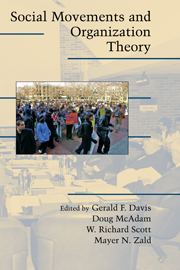Book contents
- Frontmatter
- Contents
- Contributors
- Preface
- I Creating a Common Framework
- II Political and Mobilization Context
- III Social Movement Organizations: Form and Structure
- IV Movements Penetrating Organizations
- V Conclusion
- 12 SOCIAL CHANGE, SOCIAL THEORY, AND THE CONVERGENCE OF MOVEMENTS AND ORGANIZATIONS
- 13 TWO KINDS OF STUFF: THE CURRENT ENCOUNTER OF SOCIAL MOVEMENTS AND ORGANIZATIONS
- References
- Author Index
- Subject Index
12 - SOCIAL CHANGE, SOCIAL THEORY, AND THE CONVERGENCE OF MOVEMENTS AND ORGANIZATIONS
Published online by Cambridge University Press: 05 September 2012
- Frontmatter
- Contents
- Contributors
- Preface
- I Creating a Common Framework
- II Political and Mobilization Context
- III Social Movement Organizations: Form and Structure
- IV Movements Penetrating Organizations
- V Conclusion
- 12 SOCIAL CHANGE, SOCIAL THEORY, AND THE CONVERGENCE OF MOVEMENTS AND ORGANIZATIONS
- 13 TWO KINDS OF STUFF: THE CURRENT ENCOUNTER OF SOCIAL MOVEMENTS AND ORGANIZATIONS
- References
- Author Index
- Subject Index
Summary
The essays in this volume have brought together two fields of inquiry, the study of social movements and the study of organizations, that have shown substantial convergence in core concepts and modes of analysis (McAdam and Scott, Chap. 1; Campbell, Chap. 2). Social movements are often represented by formal organizations, and organizations respond to social movements and have movement-like processes within themselves. Thus, scholars from both areas of study are finding it useful to borrow or bridge across the boundaries. This is not an entirely new development; indeed, it has a long, if fitful, history. We will not review that history here, although Elisabeth Clemens, in the next chapter, helps us to understand why that history has been so fitful. Instead, we want to give a partial answer to the question, Why now? Why is this bridging even more relevant today than it has been in the past? What events and processes “out there” almost force us to bridge and blend these two areas?
In this era of rapid social change, organizations increasingly resemble episodic movements rather than ongoing bounded actors, and organizations and movements are changing their strategies and routines in response to similar social and technological changes. Moreover, one of the most visible social movements of our time, aimed at reining in “globalization from above,” is explicitly oriented toward contemporary economic and organizational arrangements.
- Type
- Chapter
- Information
- Social Movements and Organization Theory , pp. 335 - 350Publisher: Cambridge University PressPrint publication year: 2005
- 40
- Cited by



